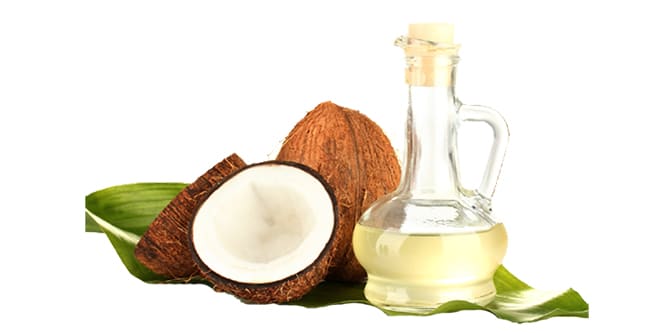Coconut oil has become very popular due to its health benefits, but it is also recommended not to overuse it because it contains high saturated fat. On the one hand, it contains beneficial fatty acids such as lauric acid, protecting the body against inflammation, and on the other hand it strengthens the immune system. Beside of its health benefits, coconut oil is very effective in skin and hair care, and can be used instead of vegetable oils in meals. It is resistant to high cooking temperatures, and can be preferred as frying oil. It also gives energy and balances blood sugar. Coconut water is appetite suppressant, can be consumed for slimming purposes.
What is coconut?
Coconut tree belonging to a palm tree family can live in tropical climates up to 100 years of age and bears fruit from 10 to 60 or 70 years of age. Coconut is a hard, shelled and hairy, white fleshed interior fruit. It is one of the most used fruits in cosmetic products. It is consumed as sweetener in powder and granular form. Coconut oil is obtained by pressing the fruit.
Nutritional value of coconut
Nutritional value of coconut depends on the part of the fruit consumed. The fleshy portion of coconut contains vitamins and minerals such as magnesium, potassium, calcium, zinc, vitamin E, K, C, iron, and is a good source of fiber. It also contains many useful fatty acids (stearic, oleic, myristic) and derivatives (betaines, ethanolamide, ethoxylates, esters).
Half a cup of coconut milk has 276 calories, 7 grams of carbohydrates, 3 grams of fiber, 3 grams of protein, 29 grams of fat (25 grams of saturated fat) and 4 grams of sugar. It also contains 316 mg (milligrams) of potassium, 44 mg of magnesium, 18 mg of sodium, and 2 mg of iron.
Nutritional value of coconut oil
One tablespoon of coconut oil contains 11 grams of saturated fat. This ratio is 7 grams in butter. Although the saturated fat content is high, up to 62% of coconut oil is composed of beneficial fatty acids. These fats are composed of medium chain fatty acids, unlike short and long chain animal fats that are harmful to the body. These are lauric, caprylic and capric fatty acids.
The benefits of oil originate from these fatty acids rarely found in nature. These fats are relatively easy to digest and are difficult to store as fats because they are processed in the liver, instead they give energy. About 40% of coconut oil is made up of lauric acid as also found in breast milk, which strengthens the immune system after being processed in the body, and develops the ability to fight against diseases and viruses. Coconut oil is OK if there is no risk of cardiovascular health and is not over-consumed. (1)
Benefits of coconut
- Good for urinary tract infections
- Protects kidney health
- Prevents hemorrhoids
- Keeps thyroid gland healthy
- Prevents formation of parasites
- Good for reflux
- Protects cardiovascular health
- Good for chronic fatigue
- Hormone regulator
- Effective against gas and vomiting
Benefits of coconut oil
Reduces symptoms of Alzheimer’s and epilepsy
The use of glucose for energy in the brain of Alzheimer’s patients is reduced. Medium-chain fatty acids in coconut oil create ketones that can be easily processed by the brain. Ketones provide the brain with energy for the processing of glucose without the need for insulin.
Thus, it helps to improve brain functions in the onset of Alzheimer’s disease. Coconut oil, which is included in the ketogenic diet (less calories, too fat), also reduces the frequency of seizures in children with epilepsy.
Beneficial to diabetes
Lauric acid in coconut oil may be useful for people with type 1 diabetes. It has been demonstrated in animal studies that medium chain fatty acids provide protection against insulin resistance. Coconut oil helps regulate blood sugar levels and minimizes the effects of the disease.
Lowers cholesterol
Coconut oil contains saturated fats that increase good HDL cholesterol. These fats smooth the damages of bad LDL cholesterol. According to researches and comparisons, coconut oil is a useful oil for heart health. (2)
Helpful to lose weight
Coconut oil has been found to reduce appetite and accelerate calorie burning. Long-term consumption of coconut oil can help the body to lose weight. According to a study conducted with women who have abdominal obesity, adding 2 tablespoons of coconut oil to the diet was effective in reducing belly fat.
Protects dental health
Coconut oil is an antibacterial solution. It effectively fights microbes in the mouth. It prevents the reproduction process of bacteria that develop in and around the gums. It fixes problems such as bad smell and tooth decay. For this, coconut oil must be applied to the teeth and does not cause side effects. It can also be used as mouthwash. (3)
Nourishes and repairs skin
It especially moisturizes dry skin, and can reduce the symptoms of eczema. It can be applied to prevent skin cracks. It nourishes the skin with the beneficial acids it contains. It is recommended to apply twice a day to the abdomen to prevent cracks caused by pregnancy. It can also be used for chapped lips.
However, it has no protection against ultraviolet rays of the sun. It is also possible to use coconut oil as an under-eye cream or make-up remover. Rinse with warm water after applying to face. (4)
Good for hair health
Coconut oil penetrates better than mineral oils. After shampoo, the coconut oil applied to the hair strands is waited for about 5 minutes and then the hair is rinsed. After a regular use, hair shines and strengthens. It reduces protein loss in hair. (5)
Good for bones
Pure coconut oil contains fatty acids that increase bone flexibility. It prevents bone degeneration and strengthens the connective muscles and tissues around the bones. It is beneficial against diseases such as bone resorption and arthritis. (6)
It strengthens immunity
The lauric acid in coconut oil turns into an antiviral substance called monolaurin in the body, and is effective in combating different types of pathogens and viruses. It has been proven the efficacy of lauric acid and monolaurin in killing bacteria, Staphylococcus aureus, a dangerous pathogen. It has been shown to be effective against Helicobacter pylori bacteria.
Fights infections
Lauric acid in coconut oil can kill harmful pathogens such as bacteria, viruses and fungi. You can apply coconut oil to affected areas, especially to improve fungal infections. Once consumed in capric acid in coconut oil, it becomes monocaprine and encourages the fight against infectious viruses. Consuming organic coconut oil is beneficial for health when you have a viral infection.
Facilitates digestion
Medium chain fatty acids have antibacterial properties. It provides easier absorption of nutrients. Especially it helps the absorption of fat-soluble vitamins, calcium and magnesium. It is claimed to help in the treatment of digestive diseases such as irritable bowel syndrome, colitis, gastric ulcer and Crohn’s disease.
The use of coconut oil
Use in meals
- Coconut oil does not contain harmful toxins produced by cooking oils. It is therefore suitable for use as cooking oil. Resistant to high temperatures.
- As a tasty alternative, put it on a toasted bread.
- If you don’t have calorie problems, eat 1 spoon of this delicious oil every morning.
- Add 1 tablespoon to smoothie mixes.
- Make eggs with it.
- Pop the corn.
- Use coconut oil instead of vegetable oil that you use when making cakes.
- Use it to fry chicken or meat.
The use of coconut oil on the skin
- Use it as a moisturizer after shaving.
- Make a body and facial peeling by adding Himalayan crystal salt or sugar to coconut oil.
- Clean your makeup with a small amount of oil you get with a cotton.
- Deodorant: Mix 1/3 cup coconut oil and 1/4 cup carbonate. You can also add different essential oils to give a nice fragrance. You can put this mixture under your armpits. Here, you have additive-free, no side effects and anti-odor deodorant!
- Use it as a moisturizer by applying it directly to the lip.
- Spread it directly to soften the cuticles.
- Use it to combat pregnancy cracks. Regular use is recommended every day.
- Use it to moisturize and treat nipples during breastfeeding.
- It is a perfect massage oil.
- Use it as a face and body moisturizer after showering or sunbathing.
- Apply the liquid coconut oil you put in the spray bottle to tan. But remember that it does not protect against harmful rays of the sun.
- Use it as a foot and elbow moisturizer by mixing the oil with salt or applying it directly.
Coconut oil and hair care
- Intensive care cream: Apply a small amount of oil to the ends of your hair, comb and make your hair loose bun before going to bed. When you wake up, wash it up.
- For hair splitting: Apply a small amount to the ends of the hair and splitting areas.
- For easy combing of hair: Take some oil into your hand and put it on dry or wet hair tips. Then comb it.
- For electrified and fluffy hair: Scrub it with a little oil and apply it to electrified parts.
Other uses
- Homemade toothpaste: Mix equal amounts of coconut oil and baking soda, and brush your teeth.
- You can also use it to remove the adhesive paper on the jar.
Benefits of coconut water
- Prevents dehydration
- It is anti-aging and protective against cancer
- Facilitates digestion
- Nutritious in terms of minerals
- Contains B-complex vitamins
- Provides the body with electrolytes
- An athlete’s drink
How to break coconut?
Coconuts need to be dehydrated before breaking. For this purpose, it is drilled by a sharp knife. The points on the nut are selected for drilling. Flowing water is filled into a glass. Then the lines on the shell are tapped to form cracks, and it is cut into pieces by a knife.
How to eat coconut?
After it is broken, the flesh is separated from its shell and eaten. If the coconuts are kept in the oven heated to 180 degrees for a while, the crust and the fleshy part are more easily separated.
Side effects of coconut oil
- Coconut oil can cause diarrhea when used for a bacterial infection in the digestive tract.
- It may cause acne on oily skin.
- People with cholesterol problems should not consume it.
- Rarely, it causes allergies.
- Detox with coconut oil can cause headaches.
- It may cause poisoning if consumed not fresh.
- Those with liver disease should consume it with caution.




